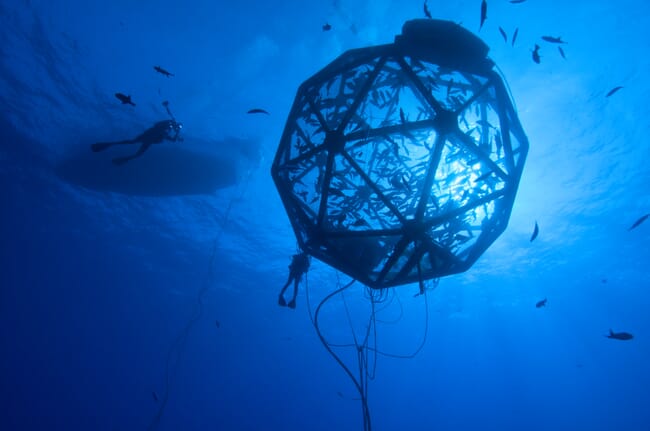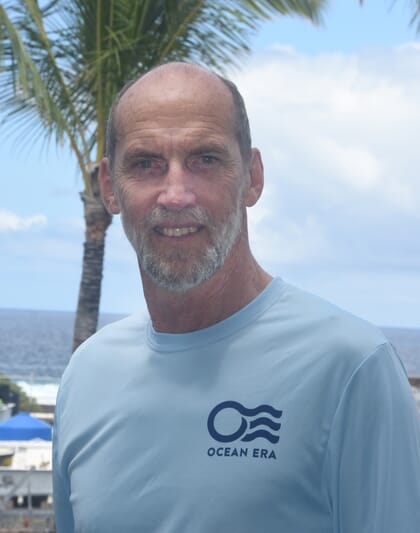
The Velella Beta-test was the world’s first unanchored “drifter” fish pen, and was recognised by TIME Magazine as one of the 25 Best Inventions of the Year in 2012. © Ocean Era
Ocean Era has announced that EPA Region 4 office has issued the NPDES permit for the company’s Velella Epsilon Project, for a single cohort of fish in a small, demonstration net pen, to be located 40 miles offshore from Sarasota, in the Gulf of Mexico. This project is anticipated to be the first time that cultured fish are grown through to harvest size in Gulf waters.
Ocean Era’s CEO, Neil Anthony Sims, expressed gratitude to the Federal authorities involved in the lengthy permit review.
“It has been over four and a half years since we first began the permitting for this project, and the staff in EPA and other Federal agencies have been incredibly persistent, thorough and unswervingly objective in their analyses, throughout the process”, he said.
Sims said that, as a demonstration project, it has already shown the inefficiency of the Federal permitting process.
“This one permit is for a single batch of no more than 20,000 fish, in one small net pen”, Sims said. “That’s about one tenth the size of a commercial-scale net pen, and perhaps only 1 percent the scale of a full commercial farm. Permitting for research, demonstration and development projects should not be this hard.”
Ocean Era is based in Kona, Hawaii, but the Project Lead, Dennis Peters, is based in Florida.
Peters stated, “We recognise that we are pioneering the process, so we have been patient in moving this permit along. One primary goal for this project is to help educate the community about the reality of offshore aquaculture – we want them to see, up front, that it’s just fish in the ocean.”
“And we also want to demonstrate the potential benefits of offshore aquaculture to the fishing and boating communities of Florida. We think that they will learn to love it!” said Peters.
The Velella Epsilon project builds on the previous successes with the Velella Beta-test and the Velella Gamma test, in Kona, Hawai`i. The Velella Beta-test – the world’s first-ever unanchored “drifter” net pen, was recognised by TIME Magazine as one of the 25 Best Inventions of the Year, in 2012.

Sims notes that leading environmental groups in the United States are supportive of offshore aquaculture
According to Sims, the previous Velella projects were popular with the local fishing community in Kona, and the local snorkel- and dive-tour operators.
“The Velella net pens acted as spectacular Fish Aggregating Devices (or FADs), attracting tuna, mahimahi, wahoo and marlin. On any morning there would be a small flotilla of recreational fishing boats, charter-boats and commercial fishing boats around the net pen. And dive tour operators would often bring their guests out to snorkel or SCUBA-dive around the pen.”
The company hopes to bring these same benefits – and transparency - to the Florida project, as well as demonstrating the minimal impacts of the operation, and the potential for producing fresh, nutritious, local seafood, providing jobs, and helping to maintain working waterfronts.
Sims noted that leading environmental groups, such as The Nature Conservancy, World Wildlife Fund, Conservation International and Environmental Defense Fund, are increasingly supportive of offshore aquaculture, so long as it is sited correctly, and operated under Best Management Practices.
“This is an opportunity for the US to truly lead. There is increasing recognition among academics and environmentalists that we need to be growing more of our own seafood here, in US waters, where we have more control of environmental standards and food safety oversight. Offshore fish farming is one of the least impactful means of producing the animal protein that we need, to feed our planet, while minimising the impacts of the global climate crisis. It is the environmentally responsible way forward; this is just one small, first step.”




